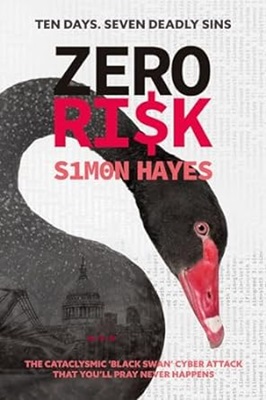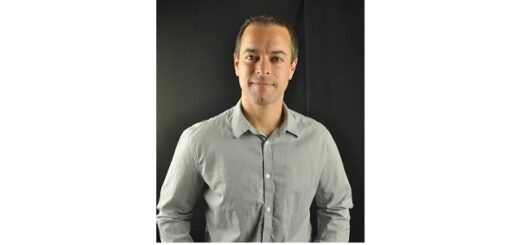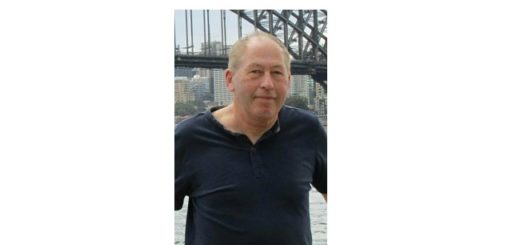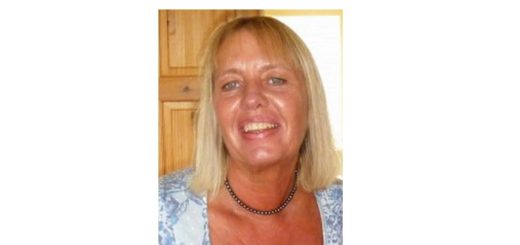Interview with Author Simon Hayes
Simon Hayes
I am thrilled to have interviewed author Simon Hayes, who shared with us details of his writing life, his book ‘Zero Ri$k‘, which was released on 25th June 2024, and answered a few fun questions. This post contains affiliate links.
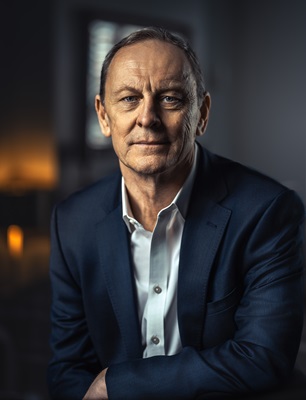
Simon Hayes is an award-winning former headhunter and investment banker. His finance career took him from his home city London, where he was a top-ranked securities analyst in the Extel and Institutional Investor surveys, to the US, Japan and Hong Kong. Search led Simon back to Tokyo, where he was recognised by Asiamoney magazine as the “Best Headhunting Executive” in Japan, then as head of a leading London-based Financial Services practice into the City’s most exclusive boardrooms.
He wrote Zero Ri$k, his first novel, whilst creating the rubriqs® people skills system. Simon spent much of 2023 in Zimbabwe on a major fraud case. The first person from his family to attend university, Simon is a Trinity Hall, Cambridge, Law graduate. Born and raised in Boston Manor, he is a lifelong supporter of Brentford FC. A proud father to India and Ivo, Simon now lives near Tower Bridge.
1) Where did the inspiration for your book come from?
I first had the outline idea for Zero Ri$k a decade or so ago when it struck me that the pace of technological change was outstripping all consideration of the attendant dangers – cyber-crime and terrorism, data misuse, AI, social control by the Big Tech companies and, of course, financial manipulation such as crypto scams. Back then, we’d only had iPhones for five or six years.
I remember clearly having a meeting of the senior managers at the company at which I worked, suggesting that we as a collective think about some of these issues… and being laughed at as a crank. I can tell you the exact date—I looked it up for this blog—Tuesday, 2 December 2014, because I walked out of the meeting in disbelief, sat down at my desk and checked the BBC news to find this article the very same morning: https://www.bbc.co.uk/news/technology-30290540 So I thought, if Stephen Hawking is worried about this kind of stuff, I may be a crank, but at least I’m in good company!
Then my partner was hit financially by a cyber fraud, so it made the issue all the more personal. The last piece of the jigsaw is that I was—and still am—disgusted that our politicians let the perpetrators and their enablers escape punishment for the financial crisis, and by the catalogue of scandals since: Bernie Madoff, Jeffrey Epstein, Lex Greensill, Sam Bankman-Fried et al. Just recently, we’ve had the Post Office Horizon IT Inquiry. It never stops. White collar crime rarely gets properly punished. As for the politicians themselves… maybe the less said the better.
With grown up children and teenage stepdaughters, I’ve seen first-hand how fascination with technology has morphed into reliance on, and now addiction to, apps and gadgets over the last twenty years. I’m from a ‘digital adoption’ generation; the young don’t have any choice. Big Tech needs them to be addicted. We take so much for granted with regard to technology. We assume our phones give us ‘the right answer’. We believe our major companies will always outsmart, or outspend, the crooks looking to commit massive cyber-fraud. We imagine that the rapid development of computers will come without major costs to society.
I just felt it was time to question a few assumptions!
2) How did you plan out the plot?
I went out and bought a huge whiteboard and plotted the outline on that (Zero Ri$k takes place over ten days at Christmas/New Year, so that was the first thing to outline). Then I started putting post it notes onto that framework whenever an idea hit me. I also spent a lot of time looking at film script structures and plans, to try to better understand and maintain pacing.
I’m a bit of a geek at heart, so then I endeavoured to put the two together on a spreadsheet. I allowed for a 110,000 word book length (or 110 minute movie length), so created a spreadsheet with 110 “cells” and tried to fit the story narrative into/across them. How’s that for geeky?
Then I did the same with the seven deadly sins… I white boarded them, went through the post it note phase and, finally, reduced it to an A3 sized spreadsheet.
And, lastly, I did exactly the same with a “character map”. But with one difference. I spent a very happy few days thinking which real life actors “best” represented the characters in the book, in my mind. Then I did a montage of them all, in photos taken at the right age for their role in the novel. Then, again, I put them on a double size A3 spreadsheet.
Once I had those three outlines in spreadsheet form, I printed them out and started the writing process. It gave me three physical reference points (printed sheets) to ‘triangulate’ with every day before I started the creative writing. They were invaluable as focus points when I tried to envisage what I wanted to put on paper each morning.
3) When did you choose the title for your book?
It was very early on. It might even have come to me as part of the original idea. The basic plot construct of a zero being added to customers’ bank accounts was always the hook, because I thought it was so simple, so baffling and yet so rapidly devastating.
4) How did you come up with the names for your characters?
It’s such a good question. I’ve read how authors wander through graveyards or, back in the day, flicked through telephone directories. Anything for inspiration. I’m afraid I don’t have a colourful or clever answer.
I used a few names from people I’ve known or met, but for the most part just let names spring up unbidden. With one exception… I thought the name of one dear friend was perfect for the Prime Minister. And it never crossed my mind to change it, even though the arc of that character changed somewhat. Unfortunately, my friend read the book on holiday last week and messaged me: “but the PM is a ****”. I could only reply, “Yes, but you’re not! ”
5) How did you go about researching the content for your book?
I’ve spent my life in and around finance. Then as a headhunter, for the last fifteen years or so, I’ve mixed with a lot of senior executives: Chairmen and CEOs of major public companies, Governors of the Bank of England, and their ilk, and some senior politicians: ‘the great and the good’. My job was to work out what made them tick. Are they really any good? Most importantly, are they honest and trustworthy? So a lot of the basic content was from experience gained over a longish career.
But then I had to tighten it up, and double-check, so I spoke with Chief Risk Officers, Chief Technology Officers and other finance professionals. The greatest compliment I received was on a business trip in Zimbabwe at the start of this year. A fellow hotel guest asked for a preview copy of Zero Ri$k. Then after reading it, admitted he worked as an adviser in finance sector IT. “I loved it,” he said, “it’s bang on the money. I felt like I was reading something real.” That was hugely satisfying.
6) What made you choose this genre?
I’ve always loved crime and thrillers. I usually have three books on the bedside table: a crime/detective/thriller novel; a history or historical fiction; and something completely different… something new to learn from. In recent times, that’s been silent movies, evolution, advances in technology and early religions!
The thriller/crime pile has got harder to replenish in recent years. There are only so many serial killer novels you (or certainly I) can read. There haven’t been that many good financial or political ones (at least in recent times), but there have been some really good non-fiction books like Michael Lewis, so I big-headedly thought, “I should have a try at a novel!”
7) How long did it take you to complete your book?
So I spent a couple of years thinking, “Shall I really try,” then in 2019 I realised, “You’re not getting any younger. If you don’t do it now, if you don’t try, then the chance might pass you by.” I was struck by one simple thought: “You can get to the end of your life and regret things you did… that’s natural. But don’t get to the end and regret something you didn’t do… that’s down to cowardice, or fear, or laziness.”
So, in May 2019, I took a month off and, at a friend’s recommendation, headed to a tiny Caribbean island called Carriacou (off Grenada) where he knew someone who owned a dilapidated eco-shack at the top of a hill.
I’d read that Ian Fleming had a set routine for writing the James Bond books in Jamaica in the 50s and 60s. In early January, he’d start a new novel. He’d get up early, have a swim, then a good breakfast, then would sit and contemplate what he was going to write that morning. At 9 a.m. he’d start and when he’d finished 2000 words he’d stop. Usually about noon. Then he’d have another swim and a damned good lunch and a snooze. He might tinker with the draft in late afternoon, then a fine dinner, bed and…. repeat the next day. How difficult can that be, I thought? Oops!!
Whereas a former journalist like Fleming could punch out 2000 words in three hours without a problem, some days it took me eight hours! Still, I persevered – all day Monday-Friday and a half-day on Saturday – and, at the end of the trip, I’d written 56,000 words. Which was fantastic! Other than that I’d only covered a quarter of the story I wanted to write. What should have been 28,000 words. So I came back and ruminated on it.
Then CoVid struck and, like everyone, I was confined to home. With hindsight, sad as it is in the broad sense, it was incredibly fortunate timing. Within a year, I’d finished the first draft… and then began the long process of finding editors, taking their advice and doing re-writes.
The manuscript was pretty much finished towards the end of 2023, other than a final proofing, but the planning and preparation for actual publishing has taken nine months. We decided on a three-pronged strategy to try to build marketing momentum: eBook on 25 May, Limited Edition Hardback on 25 June and audiobook with the wonderful Stephanie Racine on 25 July.
8) Can you describe your book in three words?
Timely. Multidimensional. Page-turner.
9) What’s the hardest part of being a writer?
From an emotional point of view, it’s a lonely role. Just you and a computer, or a pad and paper. I’ve always worked in people businesses, so to just have myself for company was hard at times.
From a practical viewpoint, there are lots of things!
The biggest challenge, for me, was that I very naively assumed that finishing the first draft was the bulk of the work done… How wrong I was! Because I don’t come from a literary background, or even know any fiction authors, I hadn’t appreciated that Draft #1 is just the start of a very long editing and re-writing cycle. Winston Churchill’s words are very appropriate for writers in this regard: “Now this is not the end. It is not even the beginning of the end. But it is, perhaps, the end of the beginning.”
When I’d finished the first complete manuscript of the novel, it was over 200,000 words. Conventional wisdom is that a debut thriller novel should be half that length!
So I worked with a couple of developmental editors to cut it. I was very blunt in saying “We need to cut this in half!” But both came back and said, “It’s not the length per se, it’s just that it sags here and there, loses momentum or focus here and there, etc. etc.”
So I worked on that, gave drafts to some friends to read and, for good or ill, they agreed. So it stayed long! Which meant that no commercial publisher would touch it. Hence I had to become a publisher and do it all myself. Learning about eBook and audiobook publication from scratch, the wonders of Amazon systems and adverts, everything, let alone printing physical copies.
I’ve been fortunate to work with some amazing collaborators – editors, printers, cover designer, PR and marketing, and the wonderful Stephanie Racine and Strathmore Studios for the audiobook. But there’s no getting away from the fact that publishing is a really hard gig for independents.
To give you one example: the award for the Theakston Old Peculier Crime Novel of the Year 2024 was announced recently. The long list of nominated novels was eighteen strong. Not one of them was independently published. Are you seriously telling me that not one of the best 18 crime novels last year was independently published? That one company was genuinely responsible for half of them?
Similarly, just trying to get books to media, journalists and bookshops is incredibly hard. It’s an industry dominated by a few big publishers. An oligopoly. That’s why the advance reader community is so fantastic, so supportive.
10) Why should our readers pick your book up?
First and foremost, Zero Ri$k is a story that will have you turning the pages to see what happens next. It’s a race-against-time thriller, but there’s a lot more to it than that. There are references to music, art and culture in the clues. There’s romantic interest. It’s a modern morality tale set unashamedly in London, but the action moves through Africa, USA and Europe too. It’s thought-provoking on a number of levels.
It’s perfect for reading by the pool if you want Dan Brown-esque escaping, but as a number of advance reviewers have been kind enough to point out, it hopefully leaves you thinking about ‘stuff’ too!
Publisher – The Rubriqs Press
Pages – 592
Release Date – 25th June 2024
ISBN 13 – 978-1738462407
Format – ebook, paperback, hardcover, audio
Synopsis
23 December 2024… Rob Tanner should have been enjoying a rare day off from his life-consuming work as Chief Operating Officer at one of the country’s largest banks. But a panicked phone call from a senior colleague forces him to put his Christmas plans on ice: more than a thousand of the bank’s accounts have seen their balances increased by a factor of ten. Exactly ten. Through the inexplicably simple addition of an extra zero. And when the inflated balances prove to be neither early Christmas gifts, nor a botched computer system upgrade, but the most sophisticated cyber attack in history, Tanner finds himself in the eye of a “Black Swan’ storm no one predicted, but anyone could have anticipated.
Tanner enlists the help of brilliant American cyber security expert Ashley Markham, but the attacks only worsen: bank balances rise remorselessly and spread to all the nation’s banks. The only clues to the hacker’s intentions are cryptic daily emails, centred on Hieronymus Bosch’s medieval representation of the seven deadly sins―and packed with colourful artistic and cultural references―taunting Tanner and the newly incumbent Prime Minister, James Allen.
With financial markets―and the very world as he knows it―on the brink of collapse, Tanner races against the clock to decode not just the bizarre emails but their deeper meaning, and the implications for who he can really trust. All the while, his former boss “The Toad” is seeking revenge… and answers of his own.
This enthralling, multi-layered debut follows the story of a disillusioned banker facing unthinkable financial Armageddon, where money has no value, stock and bond prices are meaningless, and the economy is destroyed. Can Tanner unravel the mystery of the hacker’s obsession with Bosch, sin and retribution before modern society returns to the dark ages?
Purchase Online From:
Fun Questions

1) Do you have a writing buddy?
Marlowe the donkey has been with me since I was three years old. I lost him once at Guernsey airport when we went on a family holiday in the sixties, but luckily my grandfather (who had been in the RAF all his career, but refused to fly thereafter) was travelling by boat the next day, so went and rescued him!

2) Do you have any writing quirks?
Up early, cup of tea and a biscuit, exercise, breakfast, then at 08:45 visualise what I’m going to write and at 09:00 start writing (in silence). And don’t stop until 2000 words completed! With coffee/tea and biscuits along the way…
3) Where do you write?
I usually write at home, but I’m going to post two pictures of the view from where I wrote the first quarter of the book. Sadly, Carriacou was hit very hard by a recent hurricane, but this was the incredible view five years ago.
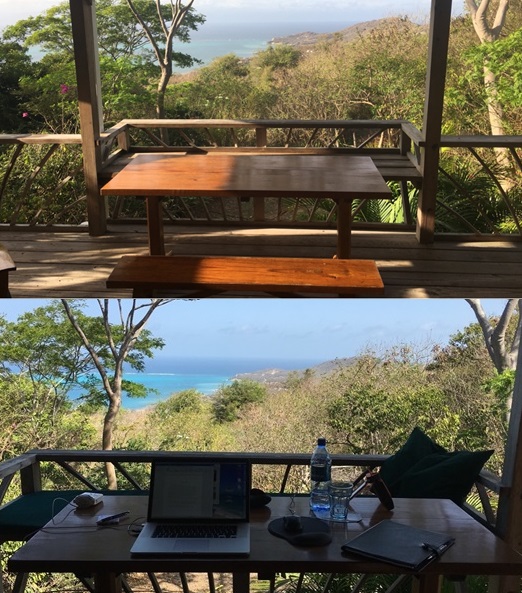
4) Your book has been made into a movie, you’ve been offered a cameo role, what will you be doing?
There’s a really important scene towards the end of the book, set in a beautiful art deco bar in a lovely European city. I’ll be the barman!
5) A talking owl has just finished reading your book, what’s the first thing he says to you?
“You must have an awful lot of random stuff in your head!”
I love collecting information. I love learning new ‘stuff’. I have a bit of a monkey brain… I love swinging from branch to branch of the “knowledge tree”, often at random, and not always to useful effect… but that’s me.
As a headhunter, I met lots of successful people, lots of smart people, lots of driven people, a (smaller) number of nice people and an (even smaller) number of people who it would be fun to go for a drink with. The common thing with the very small number who were all of those is that they love doing—and continuing to learn—interesting things. Not standing still…
Author links
Goodreads
Website
A big thank you to Simon Hayes for sharing his writing life with us and for a wonderful interview.


